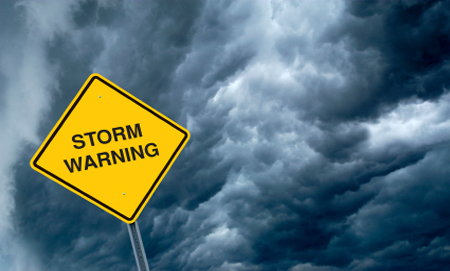
“I
will call to the LORD, and He will send thunder and rain, that you may perceive
and see that your wickedness is great, which you have done in the sight of the
LORD, in asking a king for yourselves.” (1
Samuel 12:17b)
When clouds gather, lightning flashes, thunder rolls,
and conditions are present for destructive storms, the National Weather Service
will issue a storm warning. Data is
collected and analyzed, as sensitive instruments indicate dangers that might
otherwise catch people unprepared.
Samuel was a man sensitive to the Spirit. In chapter twelve of 1 Samuel, he issues a
storm warning. God sends a literal storm
to confirm the message. Israel’s first
king, Saul has led an impressive victory, but Samuel warns of a storm that is
coming.
Samuel had been faithful—his life an inspiring example
(v.1-5). There had been a remarkable
consistency from the dawn of his childhood, the brilliant noonday of his
ministry, and now as evening shadows of age gather around him, he will leave a
legacy of devotion to God and His people.
Will this be our testimony? Will
we end well? God help us to be faithful!
The Lord is the ultimate model of faithfulness. Whereas, He has been faithful to His people,
they had not been to Him (v.6-11). They
forgot the Lord! Even so, God
disciplined them and did not disown them—remaining devoted to them and
delivering them. For the blessing of God
to rest on them, they must fear Him and obey Him (v.12-15). Those are still the twin rails upon which God’s
train of blessing runs—the old T & O: Trust and Obey!
God drives home the point rather dramatically
(v.16-18). During the time of the wheat
harvest, rain in rare in Palestine. God
stirs up a storm to show them who is in charge.
The people had demanded a king to reign over them. In so doing, they had rejected the Lord from
being their ruler. God yielded to their
request, but reminded them that their decision would not go well—and that a
gnat may as well try to control a rhinoceros as for them to think they could
depose God.
Their future prospects would be determined by the
degree of their faithful performance (v.19-21).
They confess their sin and cry out for mercy—which is always a good
place to start. If we are off track, the
first step to getting back online is to admit it—and that we need God’s help to
do so. That confession is followed by a
choice—to spurn the empty wells of this world and drink from God’s fountain
that never runs dry. Our Father may
reprove us, but He will not reject us; He may correct us, but will not cast us
out (v.22). He did not choose Israel
because they deserved it, but solely by grace.
That is true of us, as well.
If we would stay in touch with God, then His power would
deliver us, and His hand would direct us.
Samuel had such a lifestyle of communion with the Almighty (v.23). To this example here is added the testimony
of Ps.99:6 and Jer.15:1. If we never
become faithful in prayer, we will never be faithful in anything else. How could we fail to delight in His presence
and submit in obedience in view of all He has done for us? Samuel drives home the point (v.24-25).
If God is giving you a storm warning, it is time to
drop to your knees and seek shelter in Him!
No comments:
Post a Comment